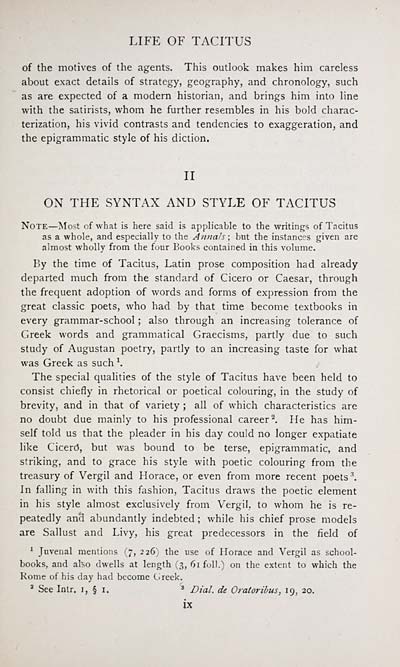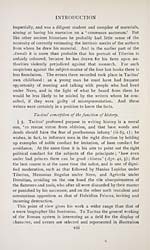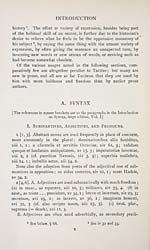Download files
Complete book:
Individual page:
Thumbnail gallery: Grid view | List view

LIFE OF TACITUS
of the motives of the agents. This outlook makes him careless
about exact details of strategy, geography, and chronology, such
as are expected of a modem historian, and brings him into line
with the satirists, whom he further resembles in his bold charac-
terization, his vivid contrasts and tendencies to exaggeration, and
the epigrammatic style of his diction.
II
ON THE SYNTAX AND STYLE OF TACITUS
Note — Most of what is here said is applicable to the writings of Tacitus
as a whole, and especially to the Aiinah; but the instances given are
almost wholly from the four Books contained in this volume.
By the time of Tacitus, Latin prose composition had already
departed much from the standard of Cicero or Caesar, through
the frequent adoption of words and forms of expression from the
great classic poets, who had by that time become textbooks in
every grammar-school ; also through an increasing tolerance of
Greek words and grammatical Graecisms, partly due to such
study of Augustan poetry, partly to an increasing taste for what
was Greek as such \
The special qualities of the style of Tacitus have been held to
consist chiefly in rhetorical or poetical colouring, in the study of
brevity, and in that of variety ; all of which characteristics are
no doubt due mainly to his professional career ^ He has him-
self told us that the pleader in his day could no longer expatiate
like Cicerd, but was bound to be terse, epigrammatic, and
striking, and to grace his style with poetic colouring from the
treasury of Vergil and Horace, or even from more recent poets ^
In falling in with this fashion, Tacitus draws the poetic element
in his style almost exclusively from Vergil, to whom he is re-
peatedly and abundantly indebted ; while his chief prose models
are Sallust and Livy, his great predecessors in the field of
^ Jnvenal mentions (7, 226) the use of Horace and Vergil as school-
books, and aho dwells at length (3, 61 foil.) on the extent to which the
Rome of his day had become L.reek.
' See Inlr. i, § i. ' Dial, de Oratoribus, 19, 20.
ix
of the motives of the agents. This outlook makes him careless
about exact details of strategy, geography, and chronology, such
as are expected of a modem historian, and brings him into line
with the satirists, whom he further resembles in his bold charac-
terization, his vivid contrasts and tendencies to exaggeration, and
the epigrammatic style of his diction.
II
ON THE SYNTAX AND STYLE OF TACITUS
Note — Most of what is here said is applicable to the writings of Tacitus
as a whole, and especially to the Aiinah; but the instances given are
almost wholly from the four Books contained in this volume.
By the time of Tacitus, Latin prose composition had already
departed much from the standard of Cicero or Caesar, through
the frequent adoption of words and forms of expression from the
great classic poets, who had by that time become textbooks in
every grammar-school ; also through an increasing tolerance of
Greek words and grammatical Graecisms, partly due to such
study of Augustan poetry, partly to an increasing taste for what
was Greek as such \
The special qualities of the style of Tacitus have been held to
consist chiefly in rhetorical or poetical colouring, in the study of
brevity, and in that of variety ; all of which characteristics are
no doubt due mainly to his professional career ^ He has him-
self told us that the pleader in his day could no longer expatiate
like Cicerd, but was bound to be terse, epigrammatic, and
striking, and to grace his style with poetic colouring from the
treasury of Vergil and Horace, or even from more recent poets ^
In falling in with this fashion, Tacitus draws the poetic element
in his style almost exclusively from Vergil, to whom he is re-
peatedly and abundantly indebted ; while his chief prose models
are Sallust and Livy, his great predecessors in the field of
^ Jnvenal mentions (7, 226) the use of Horace and Vergil as school-
books, and aho dwells at length (3, 61 foil.) on the extent to which the
Rome of his day had become L.reek.
' See Inlr. i, § i. ' Dial, de Oratoribus, 19, 20.
ix
Set display mode to: Large image | Transcription
Images and transcriptions on this page, including medium image downloads, may be used under the Creative Commons Attribution 4.0 International Licence unless otherwise stated. ![]()
| Early Gaelic Book Collections > Matheson Collection > Cornelli Taciti annalium > (13) |
|---|
| Permanent URL | https://digital.nls.uk/76567098 |
|---|
| Description | Items from a collection of 170 volumes relating to Gaelic matters. Mainly philological works in the Celtic and some non-Celtic languages. Some books extensively annotated by Angus Matheson, the first Professor of Celtic at Glasgow University. |
|---|
| Description | Selected items from five 'Special and Named Printed Collections'. Includes books in Gaelic and other Celtic languages, works about the Gaels, their languages, literature, culture and history. |
|---|

